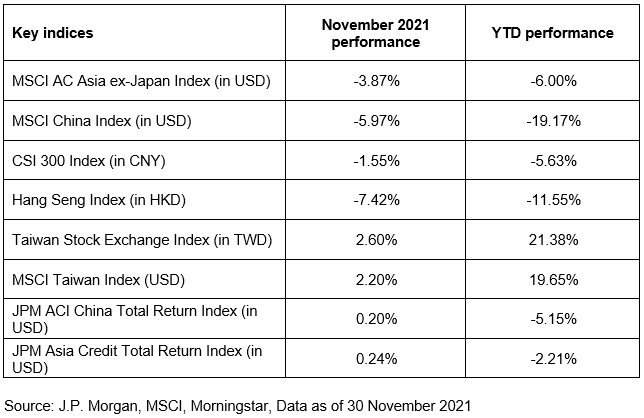Multi-Asset Perspective – December 2021
17-12-2021
The new Omicron variant sent shockwaves to global markets towards the end of November.
Short-term volatility remains as investors continue to be concerned about rising inflation and moderating growth.
China / Hong Kong Equities
- The U.S. market started to correct amid the more hawkish tone from the Fed, persistent inflation and signs of consumption softening. With Hong Kong being sensitive to the global market environment, there was selling pressure in the market. The delisting concerns of ADRs also added pressure to the market, especially to those stocks with dual-listings in Hong Kong.
- On the other hand, Hong Kong’s economy has bottomed with gradual reopening in sight. China has also begun a gradual easing to support the economy.
China A-Shares
- The narrowed PPI-CPI gap in November provided some ease to companies margin pressures, as PPI showed signs that it has peaked given the stabilizing commodity prices. Monetary easing has also begun with a RRR cut and credit supply has been gradually picking up.
- However, November showed that credit demand remained weak and it will need to take 1-2 quarters to restore confidence. Analysts also continued to downgrade China’s Q4 and 2022 GDP growth forecasts, as well as earnings estimates.
Asia Ex-Japan Equities
- The Fed has turned more hawkish with plans of speeding up the pace of tapering, with tapering expected to be finished before March. The surge in inflation expectations due to rising energy and food costs and wage growth has caused global bond yields to shift upwards, especially at the short end, as global central banks are expected to raise rates earlier. The long ends are fighting between higher inflation and weaker growth.
- Outflows continued from Asia ex-Japan equities as the current macroeconomic backdrop does not bode well for the asset class. On the other hand, sentiment in Southeast Asia has improved as markets have started to reopen.
Emerging Market Ex-Asia Equities
- The Fed’s tapering and rising Treasury yields do not bode well for emerging market equities.
- However, as OPEC has strong intentions to control oil supply to maintain the oil price at the current level – even if the Omicron variant may detriment demand – oil prices remained elevated, which should support emerging markets in the near term, particularly for oil-producing countries.
Japanese Equities
- Corporate earnings are set to continue to recover and Japan is expected to be one of the very few countries that will continue to have earnings upgrades. Also, it is the only country that should benefit from imported inflation.
- However, its recent border closure due to the Omicron variant will likely impact investor sentiment.
Asia Investment Grade Bonds
- Credit spreads continue to be tight and may widen as the economy slows down and inflation concerns remain.
- However, as volatility in the high yield space remains high, investors will remain defensive, favoring investment grade bonds.
Asia High Yield Bonds
- With the gradual easing kicking off in China and some regulatory relaxation in the property sector, investor sentiment has improved towards the higher quality Asia / China high yield bonds.
- However, with Evergrande and Kaisa downgraded to “restricted default” by Fitch Ratings after failing bond payments, investor sentiment towards lower quality high yield bonds remains weak. It will take some time for the whole asset class to restore investor confidence.
Emerging Market Debt
- Central banks around the world are expected to be more hawkish amid rising inflation expectations. With tighter liquidity and weaker EM currencies, investors will remain cautious about emerging market bonds.
Gold
- The strong U.S. dollar and rising Treasury yields do not bode well for Gold. However, the Omicron variant added uncertainty to the global economic recovery. Also, over the long term, Gold remains a good hedge against geopolitical uncertainties and would benefit from easing fiscal policies.
Multi-Asset
- Multi-asset offers lower volatility compared to traditional single-asset or balanced portfolios. However, the correlation between risk-assets, such as equities, credits, and commodities, has increased dramatically recently. In an uncertain environment with low yields, income becomes an essential source of return for investors.
The views expressed are the views of Value Partners Hong Kong Limited only and are subject to change based on market and other conditions. The information provided does not constitute investment advice and it should not be relied on as such. All materials have been obtained from sources believed to be reliable as of the date of presentation, but their accuracy is not guaranteed. This material contains certain statements that may be deemed forward-looking statements. Please note that any such statements are not guarantees of any future performance and actual results or developments may differ materially from those projected.
Investors should note that investment involves risk. The price of units may go down as well as up and past performance is not indicative of future results. Investors should read the explanatory memorandum for details and risk factors in particular those associated with investment in emerging markets. Investors should seek advice from a financial adviser before making any investment. In the event that you choose not to do so, you should consider whether the investment selected is suitable for you.
This commentary has not been reviewed by the Securities and Futures Commission of Hong Kong. Issuer: Value Partners Hong Kong Limited.






